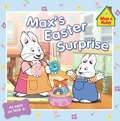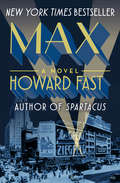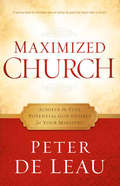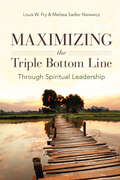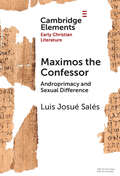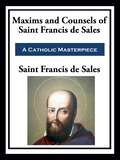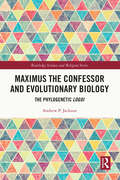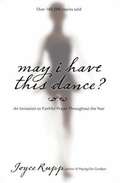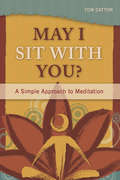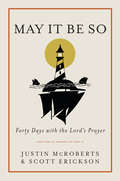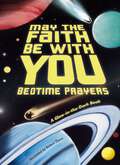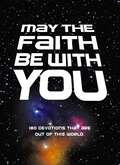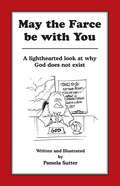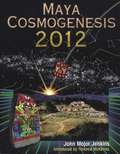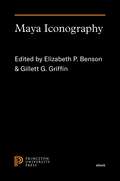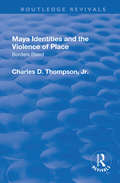- Table View
- List View
Max's Easter Surprise
by Rosemary WellsRuby and her friend Louise are decorating Easter eggs, but Max wants to have an Easter Parade. Big sister Ruby tells Max that the Easter Parade is tomorrow, but that he can help today by carrying all the decorated eggs to the Easter basket. But Max doesn?t want to just carry the eggs?he wants to march them in a parade!
Max: A Novel
by Howard FastThe New York Times–bestselling novel of one man&’s journey from New York&’s slums to become one of America&’s first film moguls—from the author of Spartacus. Max tells the story of the rise of Max Britsky, entwined with the film industry&’s beginnings near the turn of the twentieth century. When he was twelve, Max&’s father died, leaving him to scrape out a living in Manhattan&’s Lower East Side slums to provide for his mother and siblings. But Max was a natural entrepreneur, and he followed his business instincts and love of the theater to become one of the first film moguls in the history of American moviemaking. Britsky&’s life story is tragic and triumphant, and yet another example of the unmatched storytelling prowess of Howard Fast, one of the most prolific and widely read authors of the twentieth century. This ebook features an illustrated biography of Howard Fast including rare photos from the author&’s estate.
Max: It Should Only Be
by Peter BerczellerMax is a 40-something neurosurgeon with a secret – he has discovered a way to induce suicide in laboratory rats. And now he's going to track down the band of Nazis who killed his father and make them the first human subjects of his new technique. That is, if he is able to navigate his Compulsive Bibliophilia Disorder, which is tearing down his New York City apartment from the inside, his sexual obsession with a succession of frizzy-haired, denim-clad student social workers called Arlene, his Aunt Florence, and his Penile Paradox, which kicks in as soon as he encounters any woman he considers unattainable. Revenge, loss and frustrated desire are never far out of the picture in this darkly comic tale of one man's journey to oblivion.
Maximize Your Healing Power: Shamanic Healing Techniques to Overcome Your Health Challenges
by Sharon E. MartinBridging the mystical and the scientific for Maximum Medicine• Shows how applying shamanic and energy medicine techniques alongside allopathic medicine can shift your health and allow you to increase your life force• Reveals how to sense the energy body in order to understand imbalances and develop greater control over your health• Looks at new ways of viewing health challenges and visualizing the potential for healing using symbolic medicine wheels and the Andean symbol of the ChacanaFor more than 20 years, Dr. Sharon E. Martin has been blending allopathic medicine with ancient shamanic knowledge to help her patients not only heal but also increase their vitality. In this practical guide to her Maximum Medicine program, Dr. Martin shows how understanding the energetics behind health imbalances and applying shamanic and energy medicine techniques can shift not only our perspective but our health, change the course of illness, and allow us to increase our life force. Bridging the mystical and the scientific, Maximize Your Healing Power helps us visualize our potential for healing using symbolic medicine wheels based on the elements, the compass directions, the four perspectives, and the inner tasks of intuitive exploration, amplification, intention setting, and ritual. Viewing our organ systems through the Andean symbol of the Chacana can help us understand and overcome health challenges. Change and healing is enacted through the process of the Four As—become aware, allow, act, affirm—with a new mindfulness matrix amplifying and deepening the process toward a greater ability to self-reflect. Presenting a clear, stepwise approach to attaining mastery of your health through many case studies as well as simple practices and methods to gain control over illness, Dr. Martin shows how anyone can support their own healing and experience being more fully alive.
Maximize Your Marriage: The Biblical Foundations for Marriage
by Donald WikoffThis is a book intended to assist couples in identifying what the Bible has to say about marriage. It is not intended to represent the opinions of the author, but simply to provide a structured and concise view of what the Bible has to say about marriage. Since God created marriage, He is clearly the one to know how best to live out married life to accomplish the purpose for which God created this institution. Most couples who have been exposed to this teaching have felt that their eyes were opened to Biblical truths that were previously unknown to them, or not discerned as applying to marriage. The purpose of the book is to strengthen current marriages (even mature ones) as well as better prepare young people entering into a committed relationship to help them start off on a strong and solid foundation of truth and understanding of the roles of a man and a woman in this wonderful institution ordered and blessed by God.
Maximized Church: Achieve the Full Potential God Desires for Your Ministry
by Peter de LeauMaximized Church offers practical steps to be the Church When you read this book you will find out - The most important thing Jesus told us - How to maximize your prayer life - How to maximize your freedom in Christ - How to maximize your generosity - How to find God’s will for your life - How to rely on the strength of the Holy Spirit - How to maximize your Christian life This book will change your perspective on today's church and is a must-read for anyone who wants to become an active member of Christ’s body, the Church.
Maximizing the Triple Bottom Line Through Spiritual Leadership
by Louis W. Fry Melissa Sadler NisiewiczMaximizing the Triple Bottom Line through Spiritual Leadership draws on the emerging fields of workplace spirituality and spiritual leadership to teach leaders and their constituencies how to develop business models that address issues of ethical leadership, employee well-being, sustainability, and social responsibility without sacrificing profitability, growth, and other metrics of performance excellence. While this text identifies and discusses the characteristics necessary to be a leader, its major focus is on leadership—engaging stakeholders and enabling groups of people to work together in the most meaningful ways. The authors offer real-world examples of for-profit and non-profit organizations that have spiritual leaders and which have implemented organizational spiritual leadership. These cases are based on over ten years of research, supported by the International Institute of Spiritual Leadership, that demonstrates the value of the Spiritual Leadership Balanced Scorecard Business Model presented in the book. "Pracademic" in its orientation, the book presents a general process and tools for implementing the model.
Maximos the Confessor: Androprimacy and Sexual Difference (Elements in Early Christian Literature)
by Luis Josué SalésMaximos affirms in various texts (such as Difficulty 41) that sexual differentiation into male and female is inconsistent with the divine intention and will therefore be eschatologically eradicated. His affirmations have elicited a half-dozen conflicting interpretations, such as the metaphorization of these statements, where 'male' refers to drive (thymos) and 'female' to desire (epithymia), which become subordinate to reason (logos). Others maintain that he refers to the resolution of male–female agonistics. Yet others have criticized accounts that mollify the starkness of Maximos' affirmations. This Element goes further in arguing that Maximos tacitly envisions the elimination of sexual difference as sublimation of all sexual difference into male singularity. This Element overviews the exegetical and medical-anthropological precedents that framed Maximos thinking on this subject and examines some of his key texts, including his famed Difficulty 41 and several passages centered on explicating Eve and Adam, and Mary and Christ.
Maxims and Counsels of Saint Francis de Sales
by Saint Francis de SalesMaxims and Counsels of Saint Francis de Sales For Every day of the Year is a timeless spiritual guide that offers daily wisdom drawn from the gentle and profound teachings of one of Catholicism's most beloved saints. Compiled by Ella McMahon, this devotional presents a year's worth of reflections-each designed to inspire, console, and direct the heart toward holiness. Saint Francis de Sales, known for his compassionate approach to spirituality, emphasizes virtues such as humility, gentleness, simplicity, and patience. His maxims encourage readers to embrace their imperfections, trust in God's providence, and cultivate a peaceful and loving heart in all circumstances. Whether facing life's trials or joys, these counsels offer a path to inner tranquility and divine closeness. Ideal for daily meditation or spiritual reading, this collection invites readers to live each day with intention, grounded in faith, and open to the transformative power of God's love.
Maximus the Confessor and Evolutionary Biology: The Phylogenetic Logoi (Routledge Science and Religion Series)
by Andrew P. JacksonThis book brings Maximus the Confessor’s logoi doctrine into dialogue with modern-day evolutionary biology. It explores the extent to which the logoi, as described by Maximus, exhibit features that are concordant with evolution before going on to consider more discordant aspects that cannot be ignored. The author addresses the curious resonance between the logoi and evolution in a systematic way through a close reading of primary textual material allied with a deep understanding of both the classical Darwinian and ‘extended’ evolutionary syntheses. The study joins with other Maximian interpreters in attesting to the incarnational and theophanic nature of the logoi, but seeks to extend this distinctively Eastern Christo-cosmology into the problematic territory of biological evolution, a territory historically dominated by Western scholarship. The book will be of interest to scholars of religion and science, as well as Patristics and the Eastern Orthodox theological traditions.
May I Have This Dance?: An Invitation to Faithful Prayer Throughout the Year (Revised Edition)
by Joyce RuppThis revised edition of Joyce Rupp's best-selling book May I Have This Dance? (over 158,000 copies sold) has been updated with new guided meditations for each month of the year. Joyce Rupp invites readers to join God in the dance of life. She explores twelve themes, including "The Road to Life" and "The Playground of God," following each with prayer suggestions such as litanies, guided meditations, and journal keeping. Readers will be delighted to accept the invitation to dance with the Divine Partner--a dance of truth and wholeness--throughout the seasons of the year.
May I Sit with You?
by Tom CattonMeditation is a powerful reflective practice and mental discipline with roots in Southeast Asia and India. Practiced daily by millions of people, meditating is known to boost mental focus, improve awareness, and reduce stress. For anyone interested in greater physical and mental health, this step-by-step manual takes readers through mindfulness practices and techniques that yield endless benefits by improving mind-body-spirit consciousness.In order to assist the reader in finding the right path, Tom Catton describes the myriad of meditative practices and disciplines practiced around the world, influencing generations of practitioners who have found a more balanced life consisting of greater peace, harmony, and overall enjoyment.Tom Catton has been in recovery since 1971. His story appears in a twelve-step fellowship recovery book with more than seven million copies in circulation around the world, and he has been taking twelve-step meetings into Hawaii's prison system since 1984. He is also a retired marathon runner. Tom is trained in Tibetan singing bowl therapy and healing. He is on the advisory board of the Buddhist Recovery Network and teaches a meditation group in Hawaii. He is the author of The Mindful Addict (Central Recovery Press, 2010).
May It Be So: Forty Days with the Lord's Prayer
by Justin McRoberts Scott EricksonCombining prayers in two languages--words and images--this contemporary prayer guide will help you spend time in conversation with God.As people of faith, we all struggle at times to sustain a flourishing prayer life--a loss felt all the more keenly in these times of confusion, political turbulence, and global calamity. This unique book offers a timeless solution for the spiritual and skeptical alike.Combining story-driven reflections with visual and written prayers, this simple 40-day prayer guide will help you reconnect with God as you rediscover your own ongoing conversation with Him. Using the familiar refrains in the Lord's Prayer as a guide, this groundbreaking resource invites you to reconnect with God creatively and organically.
May Peace and Happiness Prevail
by Sri Mata Amritanandamayi DeviAt the 2004 Parliament of the World's Religions in Barcelona, spiritual leader Amma delivered a powerful speech on "Pathways to Peace—the Wisdom of Listening, the Power of Commitment." She emphasized the need to embrace diversity and unity, urging listeners to view religion from a spiritual perspective and reject religious bigotry. Amma highlighted the importance of redirecting efforts and resources from war towards achieving world peace. Her teachings focused on addressing both physical and spiritual poverty and emphasized selfless service to alleviate human suffering. The event concluded with an impromptu darshan where people from various backgrounds came together, symbolizing the unity needed for peace. Amma's message of love and acceptance resonated with the audience, offering hope for a harmonious and compassionate world.
May You Be Well: Everyday Good Vibes for the Spiritual
by Cheryl RickmanMay You Be Well is a collection of prayers and blessings for non-believers, believers in something or someone, and believers in everything or nothing. Just everyday good vibes for health, happiness and hope.Most of us pray when things get tough. Most of us don't have a religion, or a god. We just pray. We pray that our friends are safe, we pray that our earth will heal, we pray for help. We're asking our inner selves, a higher being, the cosmic or the divine to guide us.Sometimes we just need an affirmation to help ourselves through a bad day and sometimes we need some help coming up with the right words to manifest good fortune for ourselves and the world around us. Putting our feelings and desires into words is a key part of many spiritual practices because it helps us centre ourselves and set our intentions. Prayers, affirmations and blessings help us express positive emotions, hold space for challenging ones and call out to the universe for the intangible things we're seeking, such as love, grace and hope. May You Be Well has passages for every need, including:- Expressing gratitude and grief- Summoning positive emotions such as hope, joy, or courage- Coping with adversityAsking for help and finding reassurance- Holding space for othersCelebrating friendship- Manifesting good fortune- Wishing others wellOur spiritual lives might all look a bit different but we don't need to invoke any specific faith to share words of kindness because wishing each other well with open hearts is something we all have in common.
May You Be Well: Everyday Good Vibes for the Spiritual
by Cheryl RickmanMay You Be Well is a collection of prayers and blessings for non-believers, believers in something or someone, and believers in everything or nothing. Just everyday good vibes for health, happiness and hope.Most of us pray when things get tough. Most of us don't have a religion, or a god. We just pray. We pray that our friends are safe, we pray that our earth will heal, we pray for help. We're asking our inner selves, a higher being, the cosmic or the divine to guide us.Sometimes we just need an affirmation to help ourselves through a bad day and sometimes we need some help coming up with the right words to manifest good fortune for ourselves and the world around us. Putting our feelings and desires into words is a key part of many spiritual practices because it helps us centre ourselves and set our intentions. Prayers, affirmations and blessings help us express positive emotions, hold space for challenging ones and call out to the universe for the intangible things we're seeking, such as love, grace and hope. May You Be Well has passages for every need, including:- Expressing gratitude and grief- Summoning positive emotions such as hope, joy, or courage- Coping with adversityAsking for help and finding reassurance- Holding space for othersCelebrating friendship- Manifesting good fortune- Wishing others wellOur spiritual lives might all look a bit different but we don't need to invoke any specific faith to share words of kindness because wishing each other well with open hearts is something we all have in common.
May Your Hearts Blossom
by Sri Mata Amritan Andamayi Devi"May Your Hearts Blossom" is a biography of Mata Amritanandamayi Devi, a spiritual leader who is known for her message of love, compassion, and harmony. The book chronicles her life from her humble beginnings in a small village in India to her rise to international prominence as a spiritual teacher and humanitarian. The book highlights Devi's commitment to working for peace and understanding between people of all faiths. She is a strong advocate for interfaith dialogue and cooperation, and she has spoken at the Parliament of the World's Religions on several occasions. Devi is also known for her selfless service to others. She has founded numerous charitable organizations that provide food, shelter, and education to the poor and marginalized. She has also traveled the world to offer her blessings and guidance to people of all faiths. The book is a inspiring and inspiring account of a woman who has dedicated her life to serving others. It is a reminder that love, compassion, and harmony are the most powerful forces in the world.
May Your Walls Know Joy: Blessings for Home
by Mary Anne RadmacherHouse Blessings for Your Sacred SpaceFrom the “Martha Stewart of inspired living” comes a collection of warm words and welcoming colors to make you feel right at home.Haven, home, or house. Whether it’s a special place, a feeling, or a person—rest assured, there’s no place like home. What is a home? To author Mary Anne Radmacher, it is much more than an address. It is a refuge, a creative incubator, a celebration of story and joy. In May Your Walls Know Joy, find aphorisms and illustrations to redefine and reaffirm your idea of home.Home is where the heart is. Made for those who have moved in and moved out, felt homesickness and homecoming, sighed “home sweet home” and yelled “welcome home,” May Your Walls Know Joy is for the reader who’s coming home. Gathered under one roof, Mary Anne combines caring aphorisms, blessings for the home, and charming four-color artwork.If you’re looking for the perfect housewarming gift or house blessing, and enjoyed books like Catholic Household Blessings and Prayers, House Blessings, or Being Home, then you’ll love May Your Walls Know Joy.
May the Faith Be With You: Bedtime Prayers
by Susan Collins ThomsMay the Faith Be with You: Bedtime Prayers is filled with colorful, space-themed art and fifteen simple prayers for children to read with their parents at bedtime or anytime.With a fun intergalactic space theme, May the Faith Be with You features:Easy to read text for children ages 0 to 4Poetic prayers on each page with a short Scripture verseVivid art and colorful pagesThis book is a fun way to celebrate May the 4th, or as a gift for birthdays, baptisms, Valentine&’s Day, Easter, or during the holidays.
May the Faith Be with You: 180 devotions that are out of this world
by ZondervanLife in the Spirit isn’t about cushioned pews and easy living—it’s about adventure, risk, daring, and the pursuit of wisdom. It’s about letting the awesome power of God work through you to do things you never thought possible. In this brand-new 180-day devotional, you’ll learn the highest, truest, and most rewarding way to a life of wisdom, apprenticing with the Ultimate Master himself—Jesus Christ. May the Faith Be With You will give you a devotional experience that’s out of this world.
May the Farce be with You: A Lighthearted Look at Why God Does Not Exist
by Pamela SutterThis small book takes a brief, biting look at the many illogical reasons for belief in god. Its topics are illustrated by 23 line drawings and very funny cartoons.
Maya
by C. W. HuntingtonA stunning debut novel on sex, loss, and redemptionIt is 1975 and India is in turmoil. American Stanley Harrington arrives to study Sanskrit philosophy and escape his failing marriage. When he finds himself witness to a violent accident, he begins to question his grip on reality. Maya introduces us to an entertaining cast of hippies, expats, and Indians of all walks of life. From a hermit hiding in the Himalayan jungle since the days of the British Raj, to an accountant at the Bank of India with a passion for Sanskrit poetry, to the last in a line of brahman scholars, Stanley's path ultimately leads him to a Tibetan yogi, who enlists the American's help in translating a mysterious ancient text. Maya, literally "illusion," is an extended meditation on the unraveling of identity. Filled with rich observations and arresting reflections, it mines the porous border between memory and imagination.Maya, literally "illusion," is an extended reflection on the unraveling of identity. Filled with rich observations and arresting reflections, it mines the porous border between memory and fantasy. A stunning debut novel.
Maya Cosmogenesis 2012: The True Meaning of the Maya Calendar End-Date
by John Major JenkinsWhile researching the 2012 end-date of the Maya Calendar, John Major Jenkins decoded the Maya's galactic cosmology. The Maya discovered that the periodic alignment of the Sun with the center of the Milky Way galaxy is the formative influence on human evolution. These alignments also define a series of World Ages. The fourth age ends on December 21, 2012, when an epoch chapter in human history will come to an end. Maya Cosmogenisis 2012 reveals the Maya's insight into the cyclic nature of time, and prepares us for our own cosmogenesis--the birth of a new world.
Maya Iconography
by Elizabeth P. Benson Gillett G. GriffinA landmark work on the iconography of one of the world&’s great civilizationsThis book presents foundational work on Maya iconography from leading practitioners in fields ranging from archaeology, anthropology, and art history to linguistics, astronomy, photography, and medicine. The period discussed runs from the last centuries B.C. through the great Maya Classic period, with some discussion of later eras and of regions outside the Maya area. Featuring an incisive introduction by Elizabeth Benson and Gillett Griffin, Maya Iconography demonstrates how Maya beliefs developed over time and makes important connections between Preclassic and Classic iconography.The contributors are John Carlson, Michael Coe, David Freidel, Donald Hales, Norman Hammond, Nicholas Hellmuth, John Justeson, Barbara Kerr, Justin Kerr, Mary Ellen Miller, William Norman, Lee Parsons, Francis Robicsek, Linda Schele, David Stuart, and Karl Taube.
Maya Identities and the Violence of Place: Borders Bleed (Routledge Revivals)
by Jr Charles D. ThompsonThis title was first published in 2001. Exploring issues of diversity and cross-cultural interaction and understanding, Maya Identities and the Violence of Place offers new perspectives on borderlands and identities, providing an important case study of people from Latin America on the move. Examining issues of indigeneity, diaspora, flights from physical violence and economic repression, and efforts to remain indigenous among a proud but beleaguered people, this book is replete with stories of movement and change that operate as means to maintain identity. Thompson examines how the Jacalteco Maya of Latin America form their identities as indigenous people, despite a long tradition of movement across the rigid constraints of borders of geography, history, race and ethnicity. Religion, language, fiestas, and stories of leaving and return, all serve to bond people to their particularity. Examining the indigenous identity formations and religious convictions among the Maya in places where brutality has dominated the landscape and where violence is commonplace, this book avoids dwelling on centers of culture and explains instead how Maya concepts of identity arise from travel, contact with others, and change. Thompson reveals the ironies of classifying as natives', aboriginal or indigenous the many individuals and families who have become refugees, and explores how Maya have transcended the erroneous image of Guatemalan Indians ensconced within borders of particular land, and how they have overstepped popular portrayals of native peoples clinging tenaciously to their sacred soil as their sole means of surviving culturally and spiritually. Showing bleeding borders to be more than a recent occurrence, Thompson argues that there has never been a time when Maya did not have to travel in order to remain who they are. Exploring ideas of human to land connections and how religion among the indigenous makes change and movement possible, this book offers invaluable insight
